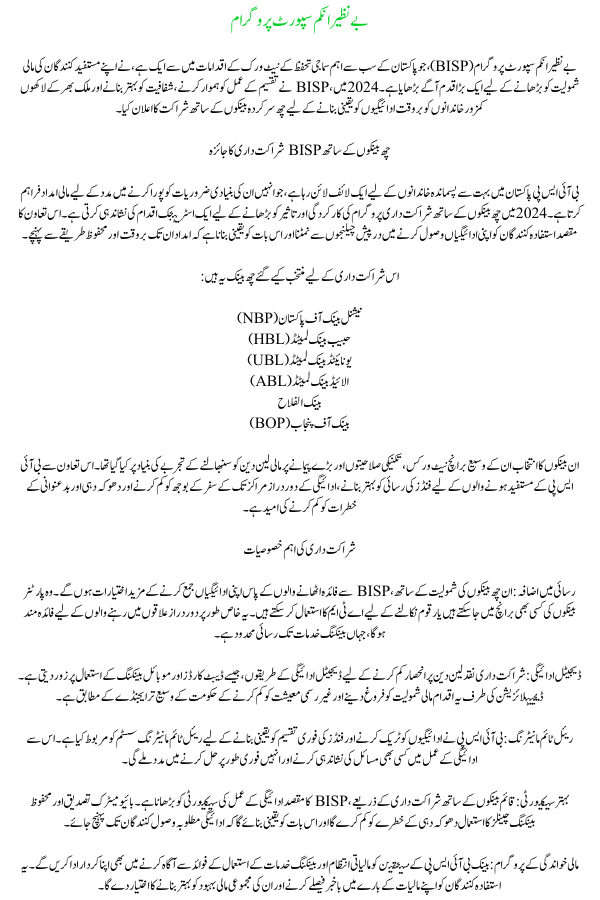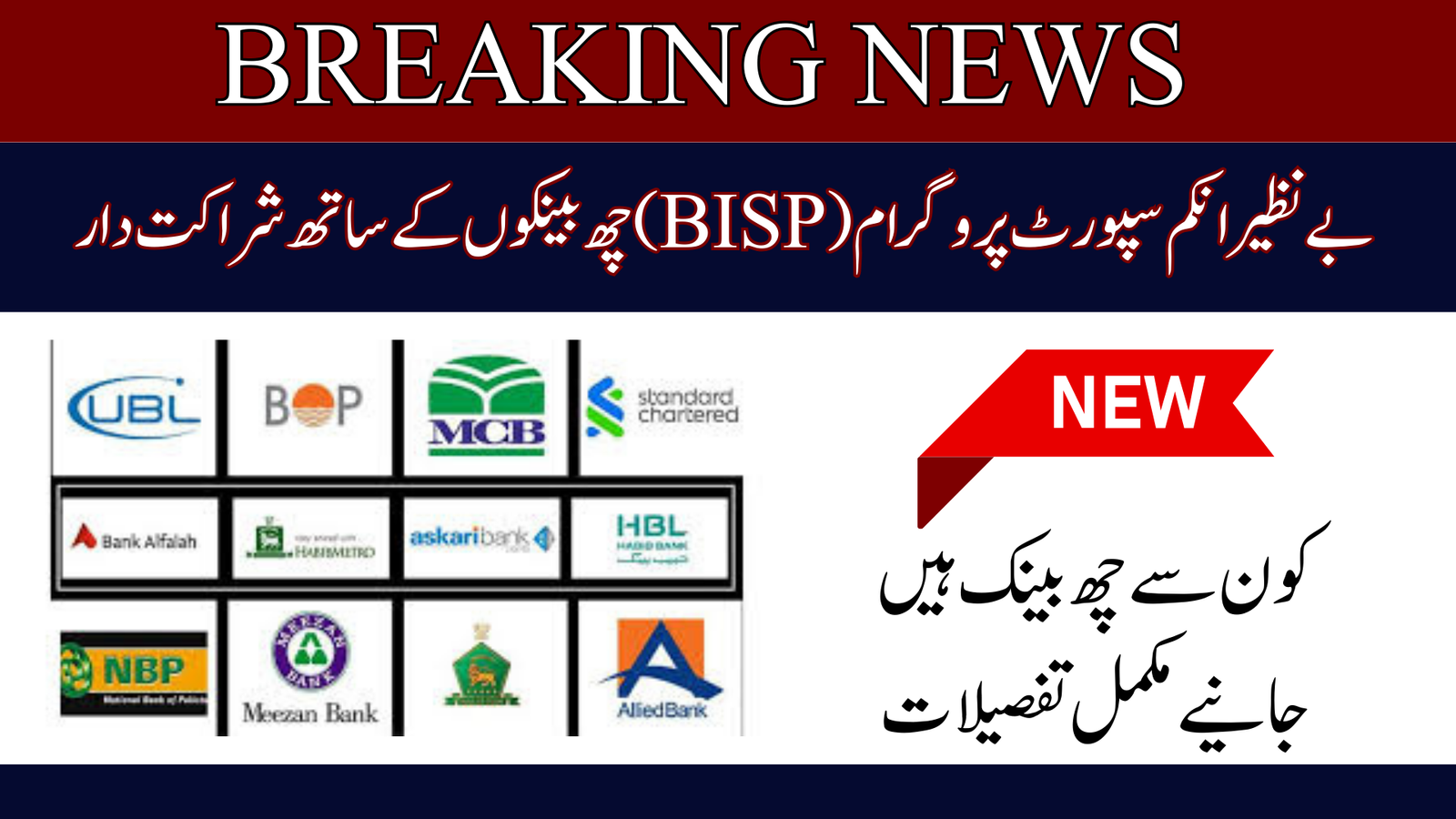Benazir Income Support Programme
The Benazir Income Support Programme (BISP), one of Pakistan’s most significant social safety net initiatives, has taken a major step forward in enhancing the financial inclusion of its beneficiaries. In 2024, BISP announced its partnership with six leading banks to streamline the disbursement process, improve transparency, and ensure timely payments to millions of vulnerable families across the country.
Overview of the BISP Partnership With Six Banks
BISP has been a lifeline for many underprivileged families in Pakistan, providing financial assistance to help them meet their basic needs. The partnership with six banks in 2024 marks a strategic move to enhance the efficiency and effectiveness of the program. This collaboration is aimed at addressing the challenges faced by beneficiaries in receiving their payments and ensuring that the assistance reaches them in a timely and secure manner.
The six banks selected for this partnership are:
- National Bank of Pakistan (NBP)
- Habib Bank Limited (HBL)
- United Bank Limited (UBL)
- Allied Bank Limited (ABL)
- Bank Alfalah
- Bank of Punjab (BOP)
These banks were chosen based on their extensive branch networks, technological capabilities, and experience in handling large-scale financial transactions. The collaboration is expected to improve the accessibility of funds for BISP beneficiaries, reduce the burden of travel to distant payment centers, and minimize the risks of fraud and corruption.
Key Features of the Partnership
- Increased Accessibility: With the involvement of these six banks, BISP beneficiaries will have more options to collect their payments. They can visit any branch of the partner banks or use ATMs to withdraw funds. This will be particularly beneficial for those living in remote areas, where access to banking services has been limited.
- Digital Payments: The partnership emphasizes the use of digital payment methods, such as debit cards and mobile banking, to reduce reliance on cash transactions. This move towards digitalization is in line with the government’s broader agenda of promoting financial inclusion and reducing the informal economy.
- Real-Time Monitoring: BISP has integrated real-time monitoring systems to track payments and ensure that funds are disbursed promptly. This will help in identifying any issues in the payment process and addressing them immediately.
- Enhanced Security: By partnering with established banks, BISP aims to enhance the security of the payment process. The use of biometric verification and secure banking channels will reduce the risk of fraud and ensure that the payments reach the intended recipients.
- Financial Literacy Programs: The banks will also play a role in educating BISP beneficiaries about financial management and the benefits of using banking services. This will empower beneficiaries to make informed decisions about their finances and improve their overall financial well-being.

Impact on BISP Beneficiaries
The partnership with six banks is expected to have a significant positive impact on BISP beneficiaries. Some of the anticipated benefits include:
- Convenience: Beneficiaries will no longer need to travel long distances to collect their payments, as they can access their funds from a wider network of branches and ATMs.
- Timely Payments: The streamlined payment process will ensure that beneficiaries receive their payments on time, helping them to better manage their household expenses.
- Reduced Costs: The use of digital payments and local banking services will reduce the costs associated with traveling to payment centers, making the process more economical for beneficiaries.
- Increased Security: The integration of secure banking systems will protect beneficiaries from fraud and theft, ensuring that their funds are safe.
Challenges and Solutions
While the partnership with six banks is a significant step forward, it also presents certain challenges that need to be addressed:
- Digital Divide: A significant portion of BISP beneficiaries, particularly in rural areas, may lack access to digital banking services or the skills to use them. To address this, BISP and its partner banks will need to invest in financial literacy programs and provide support for beneficiaries to adopt digital payment methods.
- Infrastructure Limitations: In some remote areas, banking infrastructure may still be limited, which could affect the accessibility of services. BISP and the partner banks will need to work together to expand their branch networks and ensure that even the most remote beneficiaries can access their payments.
- Fraud Prevention: While the partnership with established banks will reduce the risk of fraud, it is still essential to maintain robust security measures. Continuous monitoring and the use of biometric verification will be key in ensuring the integrity of the payment process.
Frequently Asked Questions (FAQs)
1. What is the purpose of BISP partnering with six banks in 2024?
- The partnership aims to enhance the efficiency, transparency, and security of payment disbursements to BISP beneficiaries. It is designed to provide more convenient access to funds, reduce the risk of fraud, and promote the use of digital payment methods.
2. Which banks are involved in this partnership?
- The six banks involved are National Bank of Pakistan (NBP), Habib Bank Limited (HBL), United Bank Limited (UBL), Allied Bank Limited (ABL), Bank Alfalah, and Bank of Punjab (BOP).
3. How will this partnership benefit BISP beneficiaries?
- Beneficiaries will benefit from increased accessibility to payments, reduced travel costs, timely disbursements, enhanced security, and access to financial literacy programs.
4. What challenges might arise from this partnership?
- Potential challenges include the digital divide, limited banking infrastructure in remote areas, and the need for robust fraud prevention measures. BISP and its partner banks are working to address these issues through targeted interventions.
5. How can beneficiaries access their payments through the partner banks?
- Beneficiaries can access their payments by visiting any branch of the partner banks, using ATMs, or through digital banking services such as mobile banking and debit cards.
6. Will there be any training or support for beneficiaries to use digital banking services?
- Yes, the partner banks will provide financial literacy programs and support to help beneficiaries understand and use digital banking services effectively.
7. What measures are in place to ensure the security of payments?
- The partnership includes the use of biometric verification, secure banking channels, and real-time monitoring to ensure that payments are disbursed securely and reach the intended recipients.
8. How will this partnership impact the overall efficiency of the BISP payment process?
- The partnership is expected to significantly improve the efficiency of the BISP payment process by reducing delays, minimizing fraud, and providing beneficiaries with more convenient access to their funds.
Conclusion
The partnership between BISP and six major banks in 2024 marks a significant milestone in the program’s efforts to improve the delivery of financial assistance to Pakistan’s most vulnerable citizens. By leveraging the strengths of these banks, BISP aims to provide a more efficient, secure, and accessible payment process, ultimately enhancing the impact of its social safety net initiatives. While challenges remain, the commitment to addressing them through targeted interventions and support programs ensures that the benefits of this partnership will be far-reaching and transformative for millions of Pakistani families.
